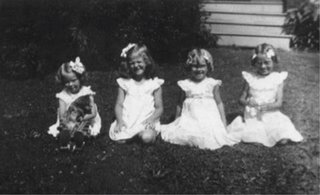
Aren't familiar with the term "age compression"? Doesn't surprise me, as executives of toy companies have recently been forced to coin the new term. It refers to children growing up too soon, but as Degenhart points out, if they were growing into maturity there wouldn't be a problem.
He helped me realize that these poor little girls aren't living out their selfishness without help. To my shame, it becomes increasingly difficult for me to relate with the "world" as I become more isolated in my thinking, values, and lifestyle. It *is* important for us to relate with unbelievers, and Degenhart helps us see that the behaviour of little girls is encouraged and marketed toward. He says,
In one sense today’s girls are simply bearing the fruit of what their mothers have sown. If mothers view their children as a burden, why should their daughters have any natural affection for playing with baby dolls? If mothers view cooking as drudgery compared to “eating out”, why should their daughters have any inclination towards playing with rolling pins, pots, and pans? And if mothers boot the little ones out into day care (also called “pre-school” by some to make it seem like its something more than glorified baby-sitting) at faster and faster rates so that they can get out of the house and into the “real world”, is it at all suprising that their daughters are doing the same thing with their own “babies”? It used to be good that the playtime of girls was patterned after their mothers’ work, but now it has become deadly.I suggest you go over and read his article, as anything I have to say he has most likely said in a more thorough way. Here's one more quote, though, just in case you don't have the time to read his lengthy post.
You might remember a quote from Janice Holt Giles in her book 40 Acres and No Mule, when she discusses the great changes that she observed transpire in Appalachia, such as roads, electricity, telephones, school buses, etc.:
What a testimony.“But the greatest change in the ways and habits of our people has come about through a strange medium - television. Almost every home has a television set nowadays, and its visible, tangible impact has been greater than a hundred years of preaching and teaching. Not all of its impact is good, but it has helped change diet, habits of dress, it has brought new standards of beautification around and inside the homes, it has brought a different kind of speech and music into the homes, even a different concept of religion. Bought for entertainment, television is a most subtle and powerful educator. In one decade, ten short years, I have seen our people changed more by television than by any other medium."
1 thoughts:
Your are Excellent. And so is your site! Keep up the good work. Bookmarked.
»
Post a Comment